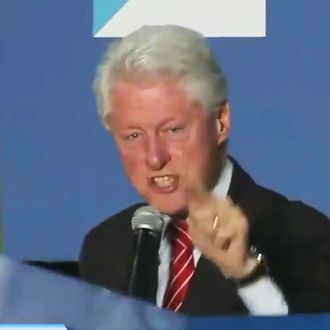
America’s “first black president” has some detractors among the African-American community of Philadelphia. While rallying support for his wife ahead of Pennsylvania’s Democratic primary, Bill Clinton found himself in a shouting argument with a group of Black Lives Matter protesters. The activists crashed Clinton’s speech, bearing homemade signs reading, “Clinton’s crime bill destroyed our communities,” and, “Welfare reform increased poverty.” One sign made reference to Hillary Clinton’s infamous use of the right-wing trope superpredators — a term that described a “new class” of young black criminals who lacked all conscience and empathy — during her husband’s reelection campaign. The former First Lady apologized for using the term when confronted by protesters back in February. Her husband took a different approach.
“I don’t know how you would characterize the gang leaders who got 13-year-old kids hopped up on crack and sent them out into the street to murder other African-American children,” Clinton told the protesters. “Maybe you thought they were good citizens. She didn’t … You are defending the people who killed the lives you say matter.”
The former president also defended his welfare-reform act, which several studies have linked to a stark increase in child poverty:
They say the welfare reform bill increased poverty. Then why did we have the largest drop in African-American poverty in history when I was president? The largest in history. What happened was the Supreme Court elected President Bush 5 to 4. Then all these Republicans took over state legislatures. We left them with enough money to take care of all the poor people who couldn’t go to work, on welfare. We left them with the money they had before the welfare rolls went down 60 percent. The Republicans took it away and they’re blaming me, and apparently her, when she had nothing to do with it.
One problem with Clinton blaming Republicans for “taking away” people’s welfare is that, without his law, they wouldn’t have been able to. Before the welfare-reform act, the federal government guaranteed assistance to impoverished families with dependent children who met a given set of eligibility requirements. Clinton’s law replaced that federal guarantee with block grants to the states. That allowed Republicans (and many Democrats) at the state-level to shift welfare spending away from their poorest, least politically engaged constituents. It was not difficult to predict that Republican governors would use this new authority in the manner Clinton now derides, or that a system of inflexible block grants would drive up the rate of extreme poverty. Peter Edelman, an assistant secretary in Clinton’s Health and Human Services Department, resigned after his complaints about the welfare bill went unheeded. In 1997, he explained the problems with the block-grant system in an article for The Atlantic:
First, that there will be no federal definition of who is eligible and therefore no guarantee of assistance to anyone; each state can decide whom to exclude in any way it wants, as long as it doesn’t violate the Constitution (not much of a limitation when one reads the Supreme Court decisions on this subject). And second, that each state will get a fixed sum of federal money each year, even if a recession or a local calamity causes a state to run out of federal funds before the end of the year.
Fifteen years after the welfare-reform act went into effect, extreme child poverty had increased by 150 percent.
Clinton concluded by warning his wife’s supporters not to believe the protesters, saying that the activists knew what he was saying was true because “they won’t hush. When someone won’t hush and listen that ain’t democracy. They’re afraid of the truth. Don’t be afraid of the truth.”
You can watch an extended version of Clinton’s back-and-forth with the protesters here:






























